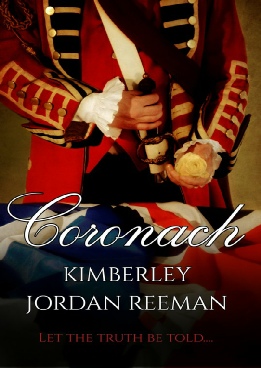Coronach Excerpt
 YOU ASK ME, how shall we overcome these shadows? How much truth is unbearable?
YOU ASK ME, how shall we overcome these shadows? How much truth is unbearable?
I have known the darkness, and the poignancy of the light. I shrink from neither, deny neither.
They are my truths. It was my life.
Here it began, and, for me, ended.
Glen Sian, the glen of the storm, is a narrow, torturous scar in the mountains between Loch Ness and Loch Cluanie. A minor military road twists up from Fort Augustus to mount a thousand feet over the heights before dropping to the glen itself. The road, no more than a path now, follows the course of the River Sian to the place where it meets Allt na Dour Oir, and a waterfall throws a bridal wreath of spray over the black rocks at the Bridge of Sian.
The military road drives further on through a pass to Kyle of Lochalsh some thirty miles to the west, bringing nothing, taking nothing away, although this was not always so.
The windows of the great house of Ardsian, far up in the sweet silence of the eastern glen, still look toward the heights: Carn Dubh, Carn Mhor, Creag na h’Iolaire, black peaks where the mist hangs and the eagles and the storms breed. They are laced with a thousand nameless streams, silver in the light of morning, soft and dark with peat, and the sound of water is sometimes the only sound in all that vast and empty silence.
There were crofts; they are ruins now. The gardens are overgrown, the old roads reclaimed by ling and bracken. No one goes there. No one is left to go.
∗ ∗ ∗
On the morning of Thursday, the twenty-fourth of April 1746, George Keppel, Lord Bury, rode with his escort at a racking gallop down the Great North Road into London.
He was a king’s son’s messenger and he brought with him momentous news, but the word of victory had preceded him, carried in the middle of the night by a hireling of the Lord Justice Clerk of Scotland. The King’s army under his Royal Highness the Duke of Cumberland had met the Jacobite forces of his cousin Charles Edward Stuart and defeated them on the field of Culloden, six miles outside of Inverness. The news was a week old when Bury brought it.
By noon, the great guns on Tower Hill were firing salutes. The ships in the river from London to Greenwich answered them. The Household Brigade, drawn up in Green Park, began to fire volley after volley, the sharp crack of musketry drowned out by the cheers of the watching crowd. The bells of every church were ringing. Broadsheets, hastily printed, spread lies and speculation about the battle.
By evening the town was blazing with fireworks. Drury Lane presented an old play resurrected from the War of the Spanish Succession called “The Honours of the Army”. The New Wells, in Lemon Street, offered “an exact view of our Gallant Army under the command of their Glorious Hero passing the River Spey, giving the Rebels battle, and gaining a Complete Victory near Culloden House.” The broadsheets gave out the King’s message to that hero, his son William Augustus: “I desire you may give my hearty thanks to those brave officers and soldiers who fought so gloriously at the late battle, and assure them, no less of my real esteem than of my constant favour and protection.”
The bells pealed all evening. The crowds in St. James’s, Piccadilly, Pall Mall, swelled and with nightfall became a mob. Any stray soldier was cheered and feted. A Court of Thanksgiving was planned for Sunday the twenty-seventh to celebrate the Royal Family’s deliverance from the Jacobite threat. Overhead, the sky-rockets burst into a million shards, brighter than the brightest jewel in a lost crown, fading like the fading of a dream.
By Tuesday the mood of the mob had turned ugly, from celebration and gratitude to vengeance, and violence, and blood.
For Scots in London, for Catholics, for Jacobites and suspected Jacobites, the flower of safety faded quickly. In the mist-shrouded Highlands, uprooted by the sword, it was already dead.
